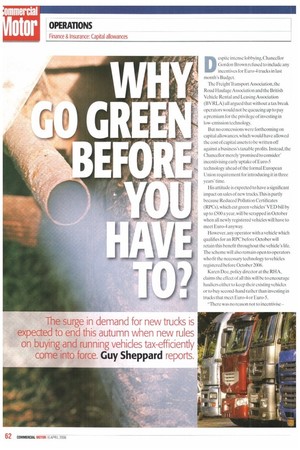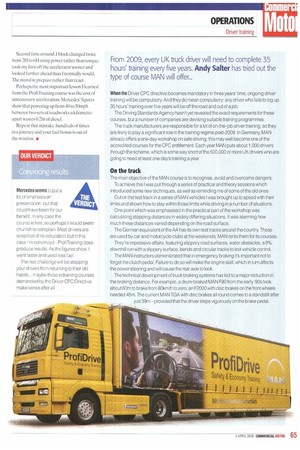The surge in demand for new trucK.s is expected to
Page 62

Page 63

If you've noticed an error in this article please click here to report it so we can fix it.
end this autumn when new rules on buying and running vehicles tax-efficiently come into force. Guy Sheppard reports.
Despite intense lobbying, Chancellor Gordon Brown refused to include any incentives for Euro-4 trucks in last month's Budget.
The Freight Transport Association, the Road Haulage Association and the British Vehicle Rental and Leasing Association (BVRLA) all argued that without a tax break operators would not be queueing up to pay a premium for the privilege of investing in low-emission technology.
But no concessions were forthcoming on capital allowances, which would have allowed the cost of capital assets to be written off against a business's taxable profits Instead, the Chancellor merely 'promised to consider' incentivising early uptake of Euro-5 technology ahead of the formal European Union requirement for introducing it in three years' time.
His attitude is expected to have a significant impact on sales of new trucks. This is partly because Reduced Pollution Certificates (RPCs), which cut green vehicles' VED bill by up to £500 a year, will be scrapped in October when all newly registered vehicles will have to meet Euro-4 anyway.
However, any operator with a vehicle which qualifies for an RPC before October will retain this benefit throughout the vehicle's life. The scheme will also remain open to operators who fit the necessary technology to vehicles registered before October 2006.
Karen Dee, policy director at the RHA, claims the effect of all this will be to encourage hauliers either to keep their existing vehicles or to buy second-hand rather than investing in trucks that meet Euro-4 or Euro-5.
"There was no reason not to ineentivise Second time around, I block changed twice from 2E1 to 6H using power rather than torque, took my foot off the accelerator sooner and looked further ahead than I normally would. The moral is: prepare rather than react.
Perhaps the most important lesson I learned from the ProfiTraining course was the cost of unnecessary acceleration. Mercedes' figures show that powering up from 40 to 50mph between two sets of roadworks a kilometre apart wastes 0.2lit of diesel.
Repeat that mistake hundreds of times in a journey and your fuel bonus is out of the window. •
































































































































































































